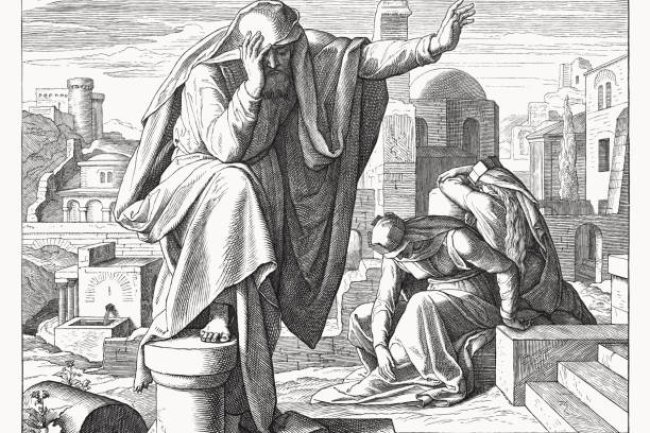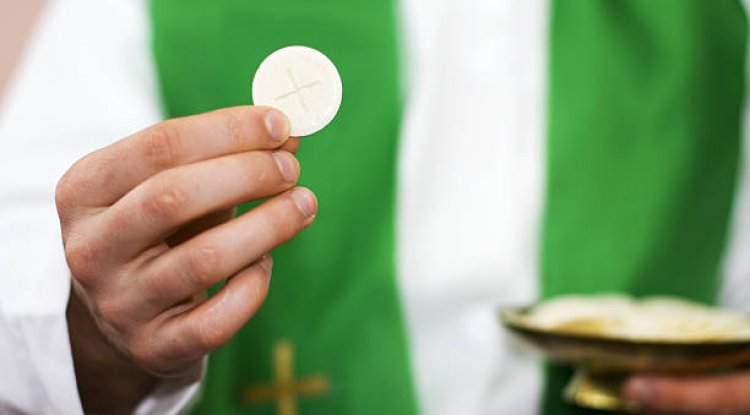MUTUAL SUPPORT BETWEEN PRIESTS AND LAITY
HOMILY FOR THIRTEENTH SUNDAY IN ORDINARY TIME, YEAR A. Readings: 2 Kings 4:8-11; 14-16a; Psalm 88; Romans 6:3-4, 8-11 and Matthew 10:37-42.

It is commonly said, “It takes two to tangle” and “two to clap.” It is on this note that the liturgy of today presents to us with profound reflection on hospitality and service as regards the relationship between the priests and the people they serve. Are we hospitable and generous to each other or we act indifferent to our needs?
The first reading presents to us, a remarkable relationship between Elisha and the Shunammite woman who sought to do something for the prophet. Together with her husband, they were sensitive to the plight and immediate need of the man of God, as she said to her husband, “I perceive that this is a man of God, who is continually passing our way” (2Kings 4:8). Elisha, on his part did not bother them with much request or exploit their generosity. Rather, he was touched by her gestures and realizing from Gehazi, he prayed for them saying, “At this season, when the time comes round, you shall embrace a son” (v.16). To her, this promise seems too good to be true; we know that the stigma associated with barrenness was so harsh in the ancient world and even in some regions in our time. The promised son will answer the longing of her heart and remove the stigma of barrenness. Thus, the presence of Elisha was indeed a blessing to this house, rather than a burden.
Highly noteworthy was the sensitivity of the Shunammite woman to the needs of Elisha. She perceived the needs of Elisha and made the move of hospitality. Unknowing to her that her acts of hospitality and generosity will be the beginning of their blessings and divine favour. This may not be common in our parishes, some of us don’t even observe or know when our priests or clerics are in need. Whether they repeat one shoe and cassock for years, it is of no concern to us. Whether they can recharge their phones or fuel their tanks, we act ignorantly of it.
The liturgy of today is so interesting, Christ in the gospel instructs His disciples to take up their cross and follow Him, signifying the willingness to bear the burdens and endure hardships that comes with following Christ. A reminder to us of the cost of discipleship, for anyone who attaches themselves more to family and friends or their possessions of any kind is not worthy of Christ. Our basic attachment should be to Christ.
We can see the nexus between the first reading and the Gospel, when Christ addresses the apostles while sending them on mission, he said, “He who receives you receives me, and he who receives me receives the one who sent me. He who receives a prophet because he is a prophet shall receive a prophet’s reward… shall receive a righteous man’s reward” (Mt. 10:40). When Christ promises rewards to those who welcome/receive a prophet or a righteous person, the context is high risk. Put differently, a spiritual war-zone, as He has earlier encouraged them “not to be afraid of those who can kill the body but cannot kill the soul but God who has power over body and soul” (vv. 26-28). The prophets and righteous persons are taking risk for Christ, and those who help them assume similar risks. Providing food, clothing, shelter, and money, they are demonstrating personal support for Christ and his church, and are also serving as encouragers to those who stand on the front lines in the war against Satan and his agents. With the above, we can affirmatively say Christ encourages hospitality and generosity to His ministers, like the case of the Shunammite couple in the first reading who attracted God’s blessings to their home. Through these, our lives and fortunes could be transformed as well.
It is on this note that I will like us to re-examine the support we give to each other. Some of us as priests shy away from related topics like this in order to protect our integrity and avoid being tagged, “this father like money too much” and so, may say little or nothing about it. On a sad note, some of us as priests are indifferent or unconcerned to the laity and their needs. We have not shown enough concern to the plights of our parishioners, to know their pains, neither do we visit them when they are sick, to listen to them when they need counselling or advice and so many other ways we have not given pastoral attention to them. On the other hand, some parishioners or lay faithful have been indifferent to the plights of their priests and religious leaders. While some constantly makes effort for the upkeep of their priests and religious leaders, others have shown lackadaisical or unconcerned attitudes towards them.
To the laity or you in person, when you need the sacraments, the priest is there for you. You need them to bring communion to the sick, they are there for you. They feed you with God’s word, bring you closer to God, present your intentions to God by offering sacrifices on your behalf as they are called to do. How do you reciprocate these generous acts from your priests? Sometimes they visit your new homes, offices and shops, and bless them for you. Even when you purchase new vehicles and other valuables, they are invited and they implore God’s blessings on them. Yet some of us do not know how to appreciate our priests for the services they render. Some do not know that there is something called “stole fee” in the church. It is a monetary contribution of the faithful who have requested the spiritual service of the priest or deacon. It is to encourage our acts of generosity and appreciation to our priests.
When the priests fail in their duties, the laities suffers and when the laities are not responding to their duties, the priests suffers for it. Invariably, the liturgy encourages mutual support between the clerics and the laity. This is necessary in order to keep each other in accordance with the laws of the church, specifically prohibiting the priests to go into business or trade personally or through others for their own advantage, without the legitimate support from the local ordinary (the bishop) or their appropriate authority (286 of the 1983 code of Canon Law). Hence, the readings remind us of the power and dignity that lies in the priesthood that should not be taken for granted. This honor, no one takes it upon himself, except that God calls him, as was Aaron (Heb. 5:4), which was exactly what the Shunammite woman perceived in Elisha, “A holy man of God” (2Kings 4:8).
In a nutshell, everyone should be treated with respect and human dignity, that is why St. Paul in the second reading reminds us of who we are, having been buried with Christ in baptism, let us walk in newness of life. By accepting Christ through our baptism, we have become one with him in death and in life. This same Christ lives in others and so, we must welcome him in others, including the least of our brethren. Let us be sensitive, let us be generous and let us be hospitable Christians. As we do this, may the prophetic blessings of Elisha and the reward that goes with generosity of heart come down upon you in the name of the Father, and of the Son and of the Holy Spirit. Amen! Peace be with you!
Happy Sunday!
Fr. Ken Dogbo, OSJ
What's Your Reaction?



















